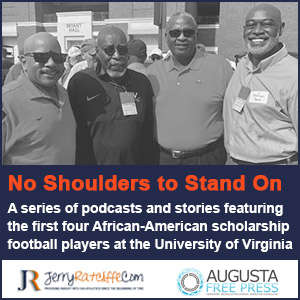Legendary Fork Union basketball coach Fletcher Arritt was one of a kind
By Jerry Ratcliffe
The basketball world lost a legend this week. Legendary because I, for one, believe he belongs in the Naismith Basketball Hall of Fame for his contributions to the game.
Fletcher Arritt, Jr., known to everyone in the basketball world as simply, “Fletch,” passed away at the age of 79. He was one of a kind.
He coached Fork Union Military Academy for 42 years. Fletch proudly would add, he taught biology for the same span. He sent more than 400 players to college basketball, seven of which made it to the NBA.
Fletch made friends easily. If you didn’t like Fletcher Arritt there had to be something wrong with you.
“What’s the one thing you always notice about Fletcher Arritt?” former North Carolina coach Roy Williams asked me. “His smile.”
Ol’ Roy was right. No wonder why just about every coach in the business admired him, liked being around him. A ready smile, no ego, a friendly conversation.
Williams and Arritt used to go at it on the basketball court when Fletch would take his FUMA post-grad team to Chapel Hill to take on the Tar Heels’ junior varsity team back when Roy was the JV coach.
“We had some great games against each other,” Arritt once told me. “I always enjoyed him.”
So did the rest of the world. Arritt was close to Hall of Famer Dean Smith for years, just one of many associations he had with some of the game’s best coaches. Long Kruger, Rick Barnes, Billy Donovan, Terry Holland, Tony Bennett, Jeff Jones, Dave Odom, Rick Pitino, John Thompson, Tubby Smith, Bill Self. The list goes on.
He once visited Bobby Knight, who asked Fletch to stay in his home. Here’s guessing that invitation was few and far between. It was Knight who suggested that Arritt should be in the hall of fame.
His greeting to me, every time we would meet, was always the same, “there’s my favorite sportswriter.” He had no idea how much that meant to me coming from one of the greatest I’ve ever known.
Upon his retirement, I think in February of 2012, I went out and spent an afternoon, just hanging out before our interview. I stayed for practice, and joined Fletch in the mess hall for dinner.
A guy who didn’t believe in trophies and such, didn’t keep track of his coaching record. I asked him in advance of my visit and he came up with 890 wins and only 283 losses.
He hung his hat on smothering man-to-man defense and an offense he labeled “The Passing Game,” the name of a documentary about Arritt’s style.
Observing an Arritt practice was an experience in itself. There he was, standing at midcourt, barking orders to his players.
No whistle, no stopwatch, no assistant coaches, just Arritt. That’s all he needed and his players _ all of them, from 1970 onward _ were keenly aware of that fact. He was often described in basketball circles as the best basketball coach you’ve never heard of. Like we said, no ego.
Fletch played at Fork Union, played at Virginia, and not longer returned to Fork Union and never left.
“I never had much drive to go to the next level,” Fletch once told me. “I did have two or three jobs that would have paid good. I don’t want to tell you who they were because you would say I’m an idiot for not making the move.”
Fletch was old school. He learned from his father over in West Virginia. Fletcher Arritt Sr., coached for close to 40 years and told Jr. a long time ago that when it was time to retire, “you’ll know when it happens.”
Fletch learned a lot from his father, sometimes the hard way.
“My father, a Christian pastor and football coach, also coached basketball and track,” Fletch explained. “He wouldn’t let me off on anything.
“I was on the B team one night and a couple of kids said, ‘You ought to let your son in the game.’ I said something smart back to my father, and he said, ‘I want to talk to you right after the game in the locker room.’ When I went back in the locker room, he said ‘You open your mouth again, your career in athletics is over.’
“That’s all he said,” Fletch said, laughing.
It was a lesson he never forgot.
“He was a wonderful coach, a Christian man,” Fletch said. “I was raised that way.”
Fletcher Arritt Jr., was the proverbial chip off the old block. A coach who believed in discipline and hard work, and a man with strong faith, an attribute that helped him throughout his illness.
He believed in building men in his gym and in his classroom.
When the school held a fund-raising campaign to renovate the Thomas Gymnasium on the FUMA campus, and to add a new court to be named the Fletcher and Betty Jean Arritt Basketball Court, Fletch said it had to be under the condition that no one tampered with the heating in the gym.
“It has to be 90 degrees and humid because that’s what turns boys into men,” said Brooks Berry, his eventual predecessor and son-in-law, now the school’s athletic director.
Berry’s only demand with the renovation was to have Fletch’s footprints painted on the court about 8 to 10 feet out from the coaches box, because that’s where Fletch coached every game from.
“When I watched him coach, I would watch referees and players run behind him while he was coaching and no referee dared blow a whistle on him,” Berry said.
Talk about the ultimate respect.
Practices were intense, games even more so.
His classroom?
“The biology class I teach is the same way … intense,” Fletch said with a sparkle in his eye.
When Arritt recognized it was time to hang up his sneakers in 2012, he had been dealing with cancer.
“There’s only one thing worse than cancer, and that’s coaching basketball and having cancer,” he said back then. “It’s just like anything else. You go out and play. You learn that you’re eight points down at half, but you still have to go out and play. You don’t change anything, you just go out and do what you have to do.”
His rules of thumb was to first, do what “Mrs. Arritt,” his loyal wife Betty Jean, told him to do, then secondly, do what his doctor instructed.
I asked him about the proudest moments during such a glorious career and, again, the modesty wouldn’t allow for such a review.
“If a guy is a Christian, I’m not sure this thing of being proud is part of your being,” Fletch said. “I’ve been fortunate to be here a long time. I’m fortunate to have a lot of good friends and a nice family that comes home at Christmas and still likes me to a certain degree, and a relationship with the 200-year-old church across the street, Fork Union Baptist.”
Memorable games? It wasn’t any of the 890 wins. It was a few of the 283 losses.
“I heard Sam Snead once say, ‘I think about the ones I lost when I had it locked up,’” Arritt said.
Those stung forever.
He considered his greatest moments as a coach as changing into his coaching gear for practice every day, going out on the court and being part of the game. If nothing else, that makes Fletcher Arritt Jr., a hall of famer, his passion and dedication to the game, the ability to build boys into men and inspire generations of players to become better people.
Fletch will never be forgotten. May his footprints remain on his gym floor for eternity.
Like Roy Williams said, we’ll always remember the smile.









